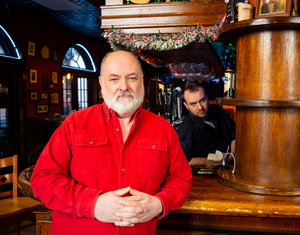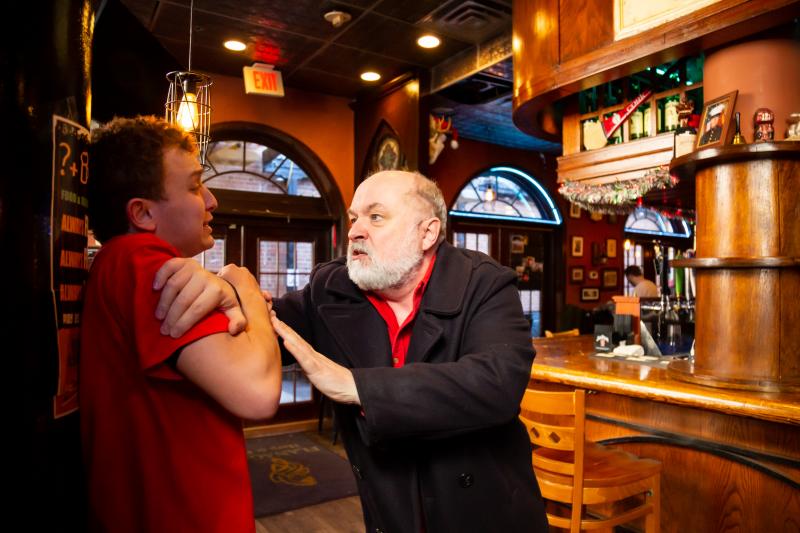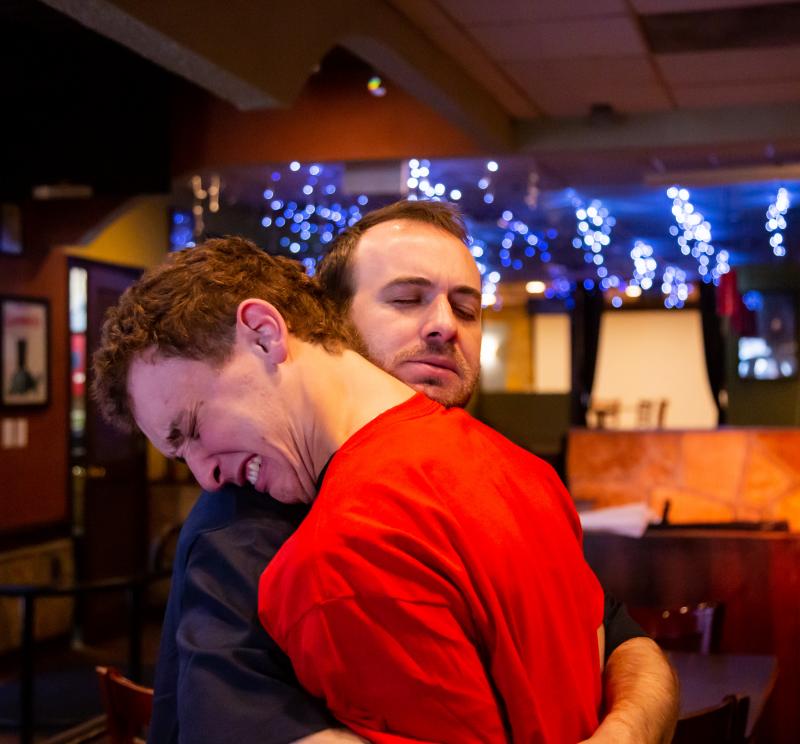Review: A MEASURE OF CRUELTY at 4615 Theatre Company

What does it mean to "be a man"?
This is a question we have long grappled with as a society, but it's one that has dramatically come to a head in recent years. Traditionally masculine characteristics - such as displays of toughness and power - are being reexamined, questioned, and redefined.
Joe Calarco's A Measure of Cruelty presents this reexamination in a compelling format - not in the expected dynamic of understanding masculinity in relation to women, members of the LGBTQIA+ community, or greater society, but within a small, isolated examination of the relationships between three men and those around them. The decision turns the focus to a more introspective approach, looking instead at how common ideals of masculinity have manifested and impacted those who have accepted them.
A Measure of Cruelty has a small scope, but packs a tremendous emotional punch. The audience is dropped in the middle of an ongoing trauma, so they are introduced to the effects before they truly understand the cause; instead, as it is for the characters, the roots are revealed over time. The show opens with Derek, a fifteen-year-old boy sneaking around a closed bar, blasting heavy metal music, stealing a soda, playing darts, and peeing in the corner. His unsupervised recreation is abruptly interrupted by the arrival of Buddy, who admonishes Derek for not staying hidden as he was told - and for the broken glass Derek knocks over when he is startled by Buddy's entrance. As Buddy prepares the bar for the evening and makes Derek clean up his mess, their tense exchange reveals that Derek is in hiding with Buddy's grudging help. Whatever the circumstances, it's clear Buddy is taking this much more seriously than Derek, who is more concerned about using the better upstairs bathroom and what Derek's "old lady" has made for him to eat than he is about his risk of exposure; despite his apparent danger, Derek is loud, boisterous, and seemingly far more unworried than he should be, and his attitude is a severe contrast to Buddy's tension and his quiet anger and grief. When the radio is turned on and the reports reference a fundraiser for Patrick, Buddy immediately tenses up and turns off the radio, while Derek, clearly oblivious to the magnitude of this, goes into a long, homophobic-slur-laced tirade about Christmas advertisements. This sets off Buddy, who finally snaps, violently confronting Derek and threatening to call the police; Derek reminds Buddy of his own vulnerability for helping him, and the two have barely stepped back from the edge when a knock startles them - it's Buddy's father and the owner of the bar, Teddy, who is unaware of Derek's squatting.

Ethan Miller (Derek) and Nick Torres (Teddy)
Once the third man enters the mix, the audience is given a much clearer understanding of the surrounding circumstances; conversations between Buddy and Teddy reveal what has happened to Patrick, and Derek's role in the affair, as well as Buddy's own struggles with PTSD following his time in Afghanistan; the physical scars the audience sees in the form of Buddy's limp are accompanied by nightmares and flashbacks, and it's apparent that Teddy doesn't fully understand the impact the experience is having on Buddy. The audience also learns of an additional trauma in Buddy's past - the loss of his brother, Eddie - and how that has manifested in anger toward his father, who seems to have forgotten Eddie's birthday entirely as well as conflated memories of the two boys. But when Teddy learns that Derek has been hiding in the bar, all three men are forced to confront who they are, the roles they've played in their circumstances, and what the right thing is - as well as what the consequences of doing the right thing will be.
4615 Theatre Company's production is directed by Calarco himself, and is set as an immersive experience in Flanaghan's Harp and Fiddle pub. The unique setting allows the audience to take a fly-on-the-wall view of the drama unfolding inside Eddie's Bar, giving them a more intimate look at the internal dynamics (Flanagan's also offers its full menu and drink service to patrons before the show, making for a great dinner theatre experience). Jordan Friend's sound design is excellent, and manages to preserve the intimacy of the set. Calarco's staging and Matthew Castleman's fight choreography take advantage of the bar setting and ensure that the audience is able to track the cast's movements with ease.
But, for a show this small and intimate, the key is the cast, and 4615's cast more than lives up to the task of this show. Ethan Miller's Derek is an exuberant teenager who is unable to fully grasp the consequences of his actions, particularly since he acted as he thought he was supposed to. Miller plays the character with an underlying sadness reflecting his rough life and lack of direction, and it's clear to the audience that Derek is seriously misguided in his eagerness to live up to what he thinks is the ideal. Nick Torres, as Teddy, plays a wonderful balance between concerned, overbearing, and difficult to please. His fierce protective attitude toward Buddy is countered by his own ideals of what a real man should do, and we often see him resort to violent outbursts when he is otherwise at a loss. When we learn about Eddie's death, the audience is shown both his deep-rooted understanding of masculinity and strength as well as his own struggles with grief and guilt.
Scott Ward Abernethy, as Buddy, is the heart of the show. In him, the audience sees the many layers of manhood coming into conflict - he was the "tough" child who got into fights and went off to war as a young man, and who later came to understand the flaws and consequences of traditional masculinity as well as the toll that it can take. His compassion for Derek is rooted in his understanding that the messages they have received on masculinity are harmful; his anger toward his father is rooted in this realization as well. Abernethy stalks the bar with a weariness that goes well beyond the limp his character brings back from the war; it's a weariness that comes from examining and reexamining your life and beliefs, and a desire to do better without fully knowing how. When he asserts, "I gotta save something, somebody," he's railing against the expectations he's come to believe are not only wrong, but actively damaging. The emotional climax of the show is a wonderful relief of the tension that builds up throughout the performance, but it is Abernethy who truly shines in that moment.

Scott Ward Abernethy (Buddy) and Ethan Miller (Derek)
A Measure of Cruelty is a deep, intimate portrait of what happens when social norms and expectations drive people to act in ways that are more damaging than fulfilling, more harmful than helpful, and how to break the cycles of violence and anger we think need to define us, especially men.
4615 Theatre Company's A Measure of Cruelty is on a limited run, with upcoming productions on January 25th at 2:00 pm and January 26th at 1:00 pm. Information on tickets and the venue can be found on 4615's website. Please note that this play contains strong language, including references violence and suicide.
Photo Credit: Ryan Maxwell Photography
Reader Reviews

Videos

